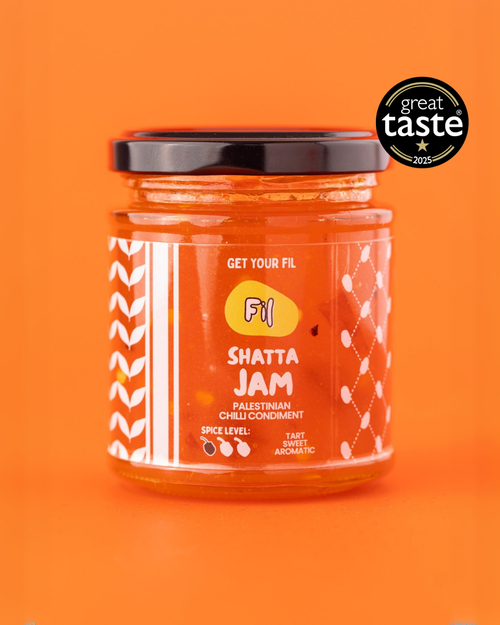When we first started Fil, we never set out to make a chilli jam.
At the time, we were still recipe testing in our home kitchens, deep in the process of developing our core range of Palestinian Shatta, a traditional fermented chilli condiment. The Shatta brine, which we had in abundance, had also piqued our interest, and we knew we could do something interesting with it. One afternoon, I was playing around with leftover habanero brine from our ferment. I’d been using it to buff up my marinades and sauces, but earlier that week, I had a craving for chilli jam, and thought I might be able to create something with the brine. It’s delicious, deep in flavour and packs a punch.
I experimented with it by adding a few more ingredients and cooking it down, and what came out was a sweet, spicy, tart, and downright addictive spicy condiment that blew our minds. A little fermentation funk, a lot of potential. Karim took one bite and said, “I don’t know what this is… but people need to try this.”
That experiment became our Shatta Jam. A fermented, roasted, and sweet Palestinian chilli preserve that sits somewhere between a hot honey, a savoury spread, and a pepper jam. It started as an experiment. It’s now one of our best-sellers. And last week, it won a Great Taste Award.
It’s the first and only Shatta-based jam we’ve seen on the market. What makes it unique is what we keep in, not what we take out. The habanero brine is full of depth, with just enough heat to build slowly. Roasted peppers give it body. Apple cider vinegar brings the tang. It’s a flavour bomb in a jar, and people have been finding new ways to use it ever since: with grilled meats, halloumi, fried eggs, sandwiches, salads, dressings, even in cocktails (we see you, spicy margarita people).
But more than anything, Shatta Jam represents what Fil is really about: inspired by tradition but unafraid to challenge tradition and create something new from it. Our food isn’t frozen in time. It evolves, just like the people making it.
While we are proud of the award, we are even more proud of what it represents: how a deeply Palestinian product can surprise, inspire, and ultimately become a staple in kitchens far beyond our own.






0 comments